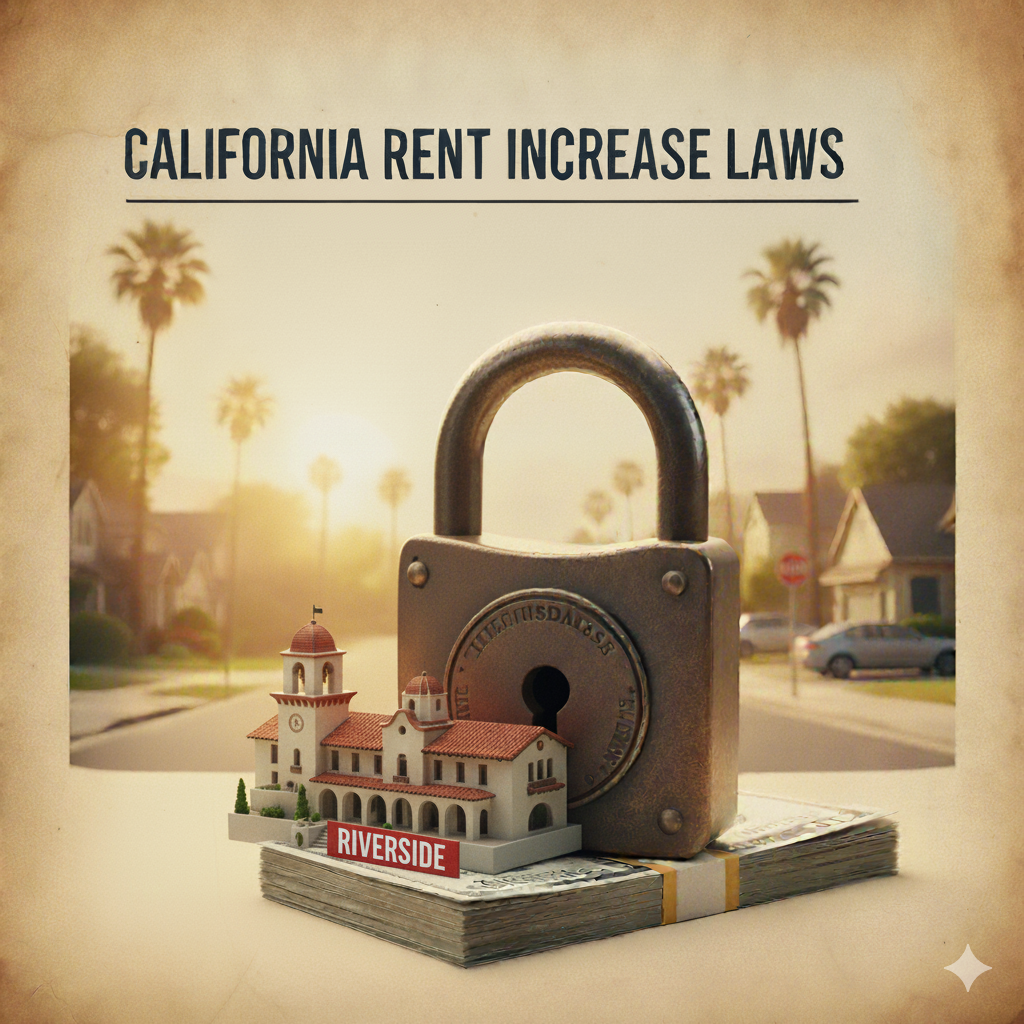
If you own rental property in Riverside, it’s essential to understand California’s rent increase laws to protect your investment and stay compliant. State legislation sets clear boundaries on how much you can raise rent, and knowing these rules helps you run your rental business smoothly while avoiding legal pitfalls.
California’s Statewide Rent Cap Explained
Through AB 1482, California limits annual rent increases for tenants. The maximum allowed increase is calculated as 5% plus the local inflation rate, or 10%—whichever is less. Your rent hikes within any 12-month period cannot exceed this threshold.
Since inflation varies, the permitted increase amount shifts annually. Here are the rent cap percentages from the past 4 years:
- August 1, 2021 through July 31, 2022: 9.1%
- August 1, 2022 through July 31, 2023: 10%
- August 1, 2023 through July 31, 2024: 10%
- August 1, 2024 through July 31, 2025: 8.6%
- August 1, 2025 through July 31, 2026: 8.8%
Remember that you can only raise rent twice within a 12-month timeframe, and the combined total cannot go beyond the annual cap. These limits don’t apply when you’re setting the initial rent for a brand-new tenant.
Riverside Properties Not Subject to Rent Control
Not every rental in Riverside falls under California’s rent cap regulations. The following property categories are exempt:
- New construction: Properties built in the past 15 years
- Affordable housing units: Properties with deed restrictions or affordable housing covenants
- Locally regulated rentals: Units already covered by more restrictive city rent control measures
- Individual ownership properties: Single-family homes and condos owned by individuals or LLCs (not corporate entities)
- Owner-occupied duplexes: Two-unit properties where the landlord lives in one unit
- Student housing: Dormitories and university-affiliated residences
While these exempt properties offer more leeway in setting rent amounts, you must still comply with California’s notification rules.
Proper Notice: A Legal Requirement
No matter your property’s exemption status, every rent increase in California demands appropriate advance notice. Inadequate notification is a common mistake that can invalidate your rent increase entirely.
Under California Civil Code Section 827, here’s what you need to provide:
- Under 10% increase: At least 30 days’ written notice
- 10% or more increase: At least 90 days’ written notice in most situations
Here’s a crucial point: the 10% calculation compares your new rent amount to what the tenant paid 12 months ago, not their current rate. This trips up many property owners.
Written notice must typically be hand-delivered, mailed, or posted and mailed if the tenant is unavailable. Electronic delivery is only permissible if you’ve previously agreed to this method in writing with your tenant.
Best Practices for Riverside Landlords
These strategies will help you stay compliant and maintain good tenant relations:
Keep Detailed Records: Track every rent increase with dates and amounts to avoid accidentally violating the two-per-year rule or annual ceiling.
Verify Your Calculations: Always check the current year’s legal limit and ensure your proposed increase complies before sending any notice.
Err on the Side of Caution: If your increase is close to 10%, opt for the 90-day notice period instead of 30 days to avoid disputes.
Document Everything: Save all rent increase notices and delivery proof. This documentation becomes invaluable if disputes arise.
Consider Your Strategy: Maxing out the legal increase isn’t always wise. Moderate adjustments can help retain quality tenants and minimize vacancy costs.
Resolving Tenant Disputes
Disputes can occur even when you’ve done everything correctly. Common issues include disagreements over notice timing, exemption status, or whether the increase exceeds legal limits.
If a tenant contests your rent increase or withholds the additional amount, proceed carefully. Evicting based on an invalid rent increase can result in case dismissal, damage to your reputation, and potential liability for the tenant’s attorney fees.
Conclusion
California’s rent regulations seek to balance landlord and tenant interests. For Riverside property owners, understanding these laws isn’t just about compliance—it’s essential for running a sustainable rental business. By tracking annual rent caps, following proper notification procedures, and maintaining thorough records, you can manage rent adjustments confidently while minimizing legal risk.
If you’re uncertain whether your planned rent increase complies with California law, or you’re facing a tenant dispute over rent, consulting with an experienced eviction attorney can help you navigate the situation and protect your business.
This content is for informational purposes only and does not constitute legal advice. Landlord-tenant law is complex and fact-specific. For advice regarding your particular circumstances, please consult a qualified eviction attorney in Riverside.

